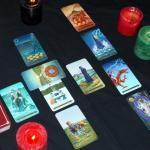In December 1946, author and Christian apologist C.S. Lewis published an essay in Strand Magazine titled A Christmas Sermon for Pagans in which he argued for the moral and ethical superiority of Christianity. He distinguished between “Pagans” (“the backward people in the remote districts who had not yet been converted” and to whom Lewis showed a modicum of respect, albeit in a patronizing way) and the “post-Christian men” of his era to whom his sermon was directed.
On Christmas Day 2023, scholar and Conservative Rabbi David Wolpe published an essay on The Atlantic website titled The Return of the Pagans in which he argued for the moral and ethical superiority of “monotheism.” Unlike Lewis, it’s unclear just what Wolpe means by “Pagans.” He uses Donald Trump and Elon Musk as contemporary examples – both of whom are highly irreligious. Paganism for Wolpe seems to mean “whatever I don’t like.”
Needless to say, the contemporary Pagan community has been outraged. And shocked. We would expect this from Fox News or some fundamentalist publication, but The Atlantic has a generally progressive editorial stance. Manny Moreno of The Wild Hunt spoke for many of us in his editorial titled “The Atlantic” publishes another attack on Pagans. Where are Pagan voices in its pages?
Holli Emore, the executive director of Cherry Hill Seminary and someone who has devoted considerable efforts to interfaith work managed to contact Wolpe. His brusque reply was “the article did not and does not address the current pagan communities nor was it intended to.” Emore’s request for dialogue was rejected.
“Pagan” has a meaning
In his sermon, C.S. Lewis asked “are there any Pagans in England for me to write to?” A few people had been describing themselves as Pagans for centuries, but Gerald Gardner would not publish Witchcraft Today and introduce Wicca to the world for another eight years. There were certainly Pagans in England and elsewhere in 1946, but I’m willing to cut Lewis some slack.
Wolpe has no such excuse. In a letter to the editor of The Atlantic shared on Facebook, anthropology professor Dr. Sabina Magliocco criticizes his straw man definitions and lack of knowledge about Paganism both old and new. Among other things, she says “it is shocking how ignorant Wolpe is about Classical Paganism, a topic about which there is a vast academic literature usually well covered in rabbinical schools.”
“I wasn’t talking about you” is no excuse, despite what a few Pagan and Pagan-adjacent people have claimed. The meaning(s) of the word “Pagan” has shifted over the past 75 years or so1. More importantly, Wolpe’s main thesis – the moral and ethical superiority of monotheism – simply doesn’t hold up to careful examination.
An appeal to “the Judeo-Christian tradition”
If Wolpe is unclear on his definition of Paganism, he’s equally vague on his definition of monotheism.
David Wolpe is a Rabbi in the Conservative tradition of Judaism. He also speaks well of Christianity, if not always accurately. As Sabina Magliocco pointed out in her letter, the idea that the rich and powerful are favored by their God or Gods comes straight out of Calvinism, not ancient Paganism.
Wolpe doesn’t even mention the second largest monotheistic religion in the world – Islam.
Though he does not use the phrase, his thesis comes out of “the Judeo-Christian tradition.” This is the post-World War II idea that Christians and Jews share a common heritage and common values and therefore should be friends and allies, especially in the face of the atheistic Communism of the Cold War.
Many of my Jewish friends do not like the phrase “Judeo-Christian.” It erases the theological and cultural differences between Judaism and Christianity, and it whitewashes centuries of Christian persecution of Jews. I tend to agree with them. Things have changed since World War II. Many Christians – and Pagans, and followers of other religions – respect and accept Jews as Jews without resorting to the weak argument of “deep down we’re all the same.”
And those who still hate Jews – whether for religious, cultural, or political reasons, or just because they’re hateful bigots – will not be persuaded by a vague appeal to a common “monotheism.”
We are all children of the Earth
That we are all children of one God is a theological proposition that may or may not be true. Obviously, I fall into the “not true” camp.
That we are all children of the Earth is a scientific fact.
We do not know how life on Earth begin – the ultimate answer may be naturalistic or it may be supernatural. I tend to think the answer lies in animism and in the primacy of consciousness, but that’s another matter for another time. What’s important here is that we know that life on Earth began once and that every living thing on Earth is descended from that first life. When Saint Francis called the wolf his brother he was speaking truth in a way he could not know intellectually even though he understood it spiritually.
Likewise, the diversity of humanity is the product of tens of thousands of years of biological and cultural mutation and adaptation. But we are all the descendants of a very small group of homo sapiens sapiens who lived in Africa around 200,000 years ago.
More relevantly to us here and now, we are all dependent on the Earth for our survival. Muskian attempts at colonizing Mars notwithstanding, we will remain dependent on the Earth for centuries to come, and perhaps forever.
Our origins and our destiny are not bound up in a Father God, but in Mother Earth.
We need no Lawgiver to understand right and wrong
I see this argument frequently, usually from conservative Christians and usually deployed against atheists, though occasionally against Pagans. In its crudest forms, it argues that without threat of divine punishment, there’s nothing to stop people from raping, murdering, and doing all sorts of nasty stuff. I always wonder about the people who make those arguments. If the fear of going to hell is all that’s keeping you from turning into Jeffrey Dahmer, there is something seriously wrong with you.
Rabbi Wolpe makes this argument more eloquently in his closing paragraph:
If we are nothing but animals, the laws of the jungle inevitably apply. If we are all pugilists attacking one another in a scramble to climb to the top of the pole, the laws of the jungle still apply. But if we are all children of the same God, all kin, all convinced that there is a spark of eternity in each person but that none of us is superhuman, then maybe we can return to being human.
We are animals. But we are social animals – our survival, our success, and even our happiness are inseparably intertwined with the survival, success, and happiness of our fellow humans. Yes, we are most concerned with those closest to us. But the more we understand we are all children of the Earth, the wider our empathy grows.
And we are intelligent animals. We have self-awareness. We have the capacity for reason, for abstract thought, and for the ability to project how our actions in the present will impact the future. Millennia ago, our barely-human ancestors figured out that murder both diminishes our collective well-being and risks our individual well-being, since the friends and relatives of the murder victim are likely to seek revenge. That murder is wrong is obvious.
We are not so far removed from the trees as we like to think. The laws of the jungle have not yet been fully supplanted by the laws of civilization. Slavery has only been outlawed in this country for 158 years, and it still exists in some places. But we have made considerable progress, and if we can manage to not drive ourselves to collective extinction, who knows how far we may advance: ethically as well as technologically.
Whether we believe in many Gods, one God, or no Gods.
Religions of rules, religions of virtues
Epistemology is the study of how we know what we know: what are our assumptions, how do we examine evidence, who do we trust? Philosophers and ordinary people have been debating this for as long as we’ve been human.
Some conservative monotheists argue that we cannot know what is truly good unless a higher power tells us, and then gives us rules to follow. To be clear: Rabbi Wolpe does not make this claim. But others who make similar arguments often do.
The stories of our Pagan ancestors are not scripture. They do not give us rules to follow, they give us virtues to embody and values to live by. When the stories speak of Gods doing things that appear unvirtuous, they remind us that life is often complicated and unclear. Sometimes virtues have to be balanced against each other. Sometimes it’s not possible to do the right thing – only the least wrong thing.
And these stories remind us that myths were never meant to be read literally.
Religions of rules make things simple, even when they’re difficult. There is value in that.
Religions of virtues require us to make our own decisions and then live with the consequences. I find this a much more satisfying approach.
Your beliefs don’t make you a better person – your actions do
At the core of Rabbi Wolpe’ essay, and at the core of this response, lies this question:
The question, however, is not whether beliefs can lead us astray, as they all can, but what sorts of beliefs are most likely to lend themselves to respect for human life and flourishing.
And on this question, history is very clear: your beliefs don’t make you a better person. Your actions do.
Ancient Paganism was brilliant and formed the foundation of modern Western society. It also gave us the Roman Empire, in all its colonial brutality.
Monotheism – of the kind Wolpe promotes – teaches loving your neighbor and caring for the stranger. It also gave us the Crusades, the Inquisition, and White Christian Nationalism.
My own Paganism teaches me that the many Gods call many different people to worship and work with Them in many different ways. If your ways are not my ways, that’s fine. I will not judge your religion by how closely it matches mine, but by how it inspires you to live in harmony with your community and with the rest of the world.
My Paganism teaches me to love the Gods and to emulate Their virtues. It teaches me to love and honor Nature as our Great Mother. It teaches me that we are never powerless, and that sometimes the smallest act can make the greatest difference. It reminds me that I am a flawed human who will never do these things perfectly, but that’s OK. Perfection is not required.
Doing what I can – be it great or small – is required.
For further reading
There have been many responses to this article in the Pagan community. Here are a few of the ones I found most helpful:
Jason Mankey: The Return Of The Pagan Scapegoats
Alythia of the Ash: Blaming Pagans For Your Pride and Pleasure
White Rose Witching: Reclaiming The Pagan Cultural Narrative
Byron Ballard: a story about the word “Pagan” on Facebook
And here’s a response from Dan McKanan and Giovanna Parmigiani of Harvard Divinity School: An Open Letter to the Pagan Community
Notes
1 For at least as long as I’ve been a part of it, the Pagan community has been dancing around the definition of “Pagan” – and with good reason. The modern Pagan movement is incredibly diverse and many of us prefer other words to describe our religious and spiritual identities, such as “polytheist” or “witch.” That doesn’t mean “Pagan” means anything any non-Pagan writer decides it means. I’ll address this in a future blog post next week.
















